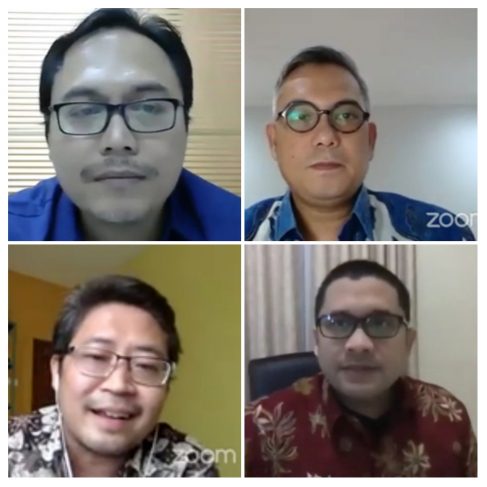FEB UI’s Afternoon Talk Series 6: “Strategy for Economic Recovery from Covid-19 Impacts”
Nino Eka Putra ~ FEB UI Public Relations Officer
DEPOK – The Economic and Community Research Institute at the Faculty of Economics and Business, Universitas Indonesia (LPEM FEB UI), took part in FEB UI’s Afternoon Talk series 6 entitled “Strategy for Economic Recovery from Covid-19 Impacts” on Tuesday (9/6/2020).
Speakers at the event were Febrio N. Kacaribu, Ph.D., the head of the Fiscal Policy Fepartment at the Ministry of Finance, Mohamad Dian Revindo, Ph.D., the head of the Business Climate and Global Value Chain Study at LPEM FEB UI, and Chaikal Nuryakin, Ph.D., the head of Digital Economy and Behavioral Economics at LPEM FEB UI. The event was moderated by Kiki Verico, Ph.D., vice chairman, research, at LPEM FEB UI. A total of 478 participants from across Indonesia joined the virtual discussion out of the 800 people who registered. The event was broadcast via FEB UI’s YouTube account.
Mohamad Dian Revindo, the first speaker, said that the new normal in economic activities means business players complying with the Covid-19 health protocol and the public maintaining awareness of healthy living to prevent the second wave of the pandemic while restoring the economy. The momentum for recovery is based on economic conditions in the last two months: per May (low purchasing power, low food inflation, strong non-oil and gas exports); per June (PSBB relaxation, people resuming economic activity, the rupiah strengthening).

“Economic recovery can be achieved by utilizing information and communication technology (ICT) literacy of businesses and consumers, paying attention to the vulnerable and the survivor (surviving because the sector grows and surviving because of innovation), villages as engine of recovery, implementation of health protocols in public facilities and business entities (detailed information provided, supervised, rated, reward, punishment),” said Revindo.
Febrio N. Kacaribu, the second speaker, explained that the Covid-19 pandemic has a domino effect on health, social, economic and financial aspects. Global economic activity started to show improvement in May along with the relaxation/normalization. Although still in contraction, the global manufacturing Purchasing Managers Index (PMI) in May rebounded from its lowest point. Countries that recorded improvements in the manufacturing PMI, including the US, Europe, China and Malaysia, were supported by relaxation of lockdowns/social distancing.

Global investor confidence continues to improve, especially since cases of Covid-19 infections have slowed in several countries and life has returned to normal. The performance of the global financial sector continues to follow a positive trend. The volatile global financial sector has become increasingly stable, indicated by the VIX Index and the Move Index, which have consistently decreased since April. Developed and developing country stocks continue to rebound. Capital inflows have started to return to developing countries, although still relatively limited.
“Basically, the impact of Covid-19 on Indonesia’s economy poses a threat to the consumption side. Growth in Q1-2020 shows that consumption, including non-profit institutions serving households (LNPRT), increased by 2.7%, investment or gross fixed capital formation (PMTB) 1.7%, government consumption 3.7%, exports 0.2%, and imports -2.2%. Meanwhile, the manufacturing sector grew 2.1% in Q1-2020, trade 1.6%, transportation 1.3%, accommodation and food 2.0%, agriculture 0.0%, mining 0.4% and construction 2.9%,” said Febrio.
Febrio went on to say that the pre-Covid-19 state budget projection for economic growth in 2020 was 5.3%. However, the figure was revised down to -0.4% in a worst-case scenario after the pandemic broke out and 2.3% in a bad scenario. In addition, the poverty rate increases by 4.86 million people in a worst-case scenario and 1.89 million in a bad scenario. Unemployment rate increases by 5.23 million in a worst-case scenario and by 2.92 million in a bad scenario. The government took various extraordinary measures to prevent a worst-case scenario for growth and welfare.
“The government has dirbursed Rp677.20 trillion for Covid-19 handling. Of the total, Rp87.55 trillion was allocated for the health sector, Rp203.90 trillion for social security, Rp123.46 trillion for MSMEs, Rp120.61 trillion for business incentives, Rp44.57 trillion for corporate financing, and Rp97.11 trillion for government ministries/institutions and local governments. In addition, Rp589.65 trillion was allocated for national economic recovery. Of the total, Rp205.20 trillion was allocated for the demand side and Rp384.45 trillion for the supply side,” said Febrio.
Chaikal Nuryakin, the third speaker, said that public consumption decreased both in number and size during the Covid-19 pandemic. This is even before the PSBB were implemented because there are people who are risk averse, over 50 years old and have underlying medical conditions that could develop into critical illness if they are infected with Covid-19. The implementation of the PSSB has caused economic agents with large purchasing power such as hotels disappear from the market, causing aggregate demand to drop dramatically.

An important framework in economic recovery is that human life and health is of utmost importance in addition to business sustainability, especially companies in the essential sectors. After health, the sustainability and quality of education should be of concern because of the medium and long-term impacts.
The World Health Organization recommends keeping a minimum distance of one meter from others. The implementation of this recommendation for the general public and companies is highly dependent on the characteristics of each company. The 50% maximum capacity rule should be reviewed and the one-meter social distancing rule should only apply to groups, not between individuals.
The growing digital sector also needs to be considered to increase government revenue through taxes. Taxes on digital entertainment platforms are possible, but taxes on education and health platforms should be avoided. “Over time, the government must be able to take advantage of the momentum to accelerate demand. Economic recovery when a vaccine is not yet available requires a balance of policies. You need more than just money to dance on the tightrope with Covid-19,” Chaikal concluded. (hjtp)
(lem)






